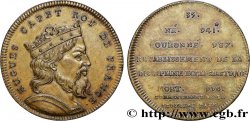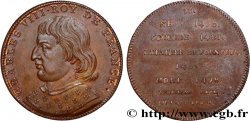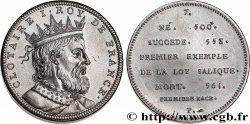fjt_741729 - SÉRIE MÉTALLIQUE DES ROIS DE FRANCE Règne de PEPIN - 22 - frappe Louis XVIII, lourde n.d.
35.00 €
Menge
In den Warenkorb

Type : Règne de PEPIN - 22 - frappe Louis XVIII, lourde
Datum: n.d.
Metall : Kupfer
Durchmesser : 32 mm
Stempelstellung : 12 h.
Gewicht : 11,94 g.
Rand cannelée
Seltenheitsgrad : R2
Pedigree :
Exemplaire provenant de la Collection MARINECHE
Vorderseite
Titulatur der Vorderseite PEPIN ROY DE FRANCE.
Beschreibung Vorderseite Buste imaginaire drapé et couronné à droite.
Rückseite
Titulatur der Rückseite 22 - NÉ 714 - SACRÉ 752 - ROME DELIVRÉE 756 - MORT 768 - COMMENCEMENT DE LA SECONDE RACE . P.
Beschreibung Rückseite en neuf lignes.
Kommentare
Pépin le Bref, né en 715, il meurt le 24 septembre 768 à Saint-Denis (au nord de Paris). Fils cadet de Charles Martel et de Rotrude, et père de Charlemagne, il doit son surnom à sa petite taille. Il est :
* Maire du palais de Neustrie, (741-751), avec la Bourgogne et la Provence.
* Roi des Francs, (751-768).
À la mort de Charles Martel, en 741, sa charge de maire du palais est partagée, selon la tradition franque, entre ses deux fils. L'aîné Carloman, devient maire du palais d'Austrasie et obtient l'Alémanie et la Thuringe, Pépin devient maire du palais de Neustrie et garde la Provence et la Bourgogne. Griffon, le troisième fils de Charles Martel n'obtient que quelques comtés. Les frères redéfinissent en 742 à Vieux-Poitiers leurs parts respectives et remettent en question les limites traditionnelles des royaumes francs.
En cette fin de la période de décadence de la dynastie mérovingienne, les souverains, appelés par la suite rois fainéants, n'ont plus aucune autorité, et les maires du palais sont les réels dirigeants de l'État. Carloman et Pépin se partagent alors le pouvoir du royaume franc et vont diriger le pays à deux. Ils luttent tout d'abord pour ramener la stabilité aux frontières du royaume.
Pour la suite de sa biographie, voir http://fr.wikipedia.org/wiki/P%C3%A9pin_le_Bref.
Pepin the Short, born in 715, died on September 24, 768 in Saint-Denis (north of Paris). Younger son of Charles Martel and Rotrude, and father of Charlemagne, he owes his nickname to his small size. He is: * Mayor of the palace of Neustria, (741-751), with Burgundy and Provence.
* King of the Franks, (751-768).
On the death of Charles Martel in 741, his position as mayor of the palace was shared, according to Frankish tradition, between his two sons.. The eldest, Carloman, became mayor of the palace of Austrasia and obtained Alemannia and Thuringia, Pepin became mayor of the palace of Neustria and kept Provence and Burgundy. Griffon, the third son of Charles Martel, only obtained a few counties. In 742, the brothers redefined their respective shares in Vieux-Poitiers and called into question the traditional limits of the Frankish kingdoms..
At the end of the decadent period of the Merovingian dynasty, the sovereigns, later called lazy kings, no longer had any authority, and the mayors of the palace were the real leaders of the State.. Carloman and Pepin then shared the power of the Frankish kingdom and would rule the country together.. They are first fighting to bring stability to the kingdom's borders..
For the rest of his biography, see http://fr. Wikipedia. org/wiki/P%C3%A9pin_le_Bref
* Maire du palais de Neustrie, (741-751), avec la Bourgogne et la Provence.
* Roi des Francs, (751-768).
À la mort de Charles Martel, en 741, sa charge de maire du palais est partagée, selon la tradition franque, entre ses deux fils. L'aîné Carloman, devient maire du palais d'Austrasie et obtient l'Alémanie et la Thuringe, Pépin devient maire du palais de Neustrie et garde la Provence et la Bourgogne. Griffon, le troisième fils de Charles Martel n'obtient que quelques comtés. Les frères redéfinissent en 742 à Vieux-Poitiers leurs parts respectives et remettent en question les limites traditionnelles des royaumes francs.
En cette fin de la période de décadence de la dynastie mérovingienne, les souverains, appelés par la suite rois fainéants, n'ont plus aucune autorité, et les maires du palais sont les réels dirigeants de l'État. Carloman et Pépin se partagent alors le pouvoir du royaume franc et vont diriger le pays à deux. Ils luttent tout d'abord pour ramener la stabilité aux frontières du royaume.
Pour la suite de sa biographie, voir http://fr.wikipedia.org/wiki/P%C3%A9pin_le_Bref.
Pepin the Short, born in 715, died on September 24, 768 in Saint-Denis (north of Paris). Younger son of Charles Martel and Rotrude, and father of Charlemagne, he owes his nickname to his small size. He is: * Mayor of the palace of Neustria, (741-751), with Burgundy and Provence.
* King of the Franks, (751-768).
On the death of Charles Martel in 741, his position as mayor of the palace was shared, according to Frankish tradition, between his two sons.. The eldest, Carloman, became mayor of the palace of Austrasia and obtained Alemannia and Thuringia, Pepin became mayor of the palace of Neustria and kept Provence and Burgundy. Griffon, the third son of Charles Martel, only obtained a few counties. In 742, the brothers redefined their respective shares in Vieux-Poitiers and called into question the traditional limits of the Frankish kingdoms..
At the end of the decadent period of the Merovingian dynasty, the sovereigns, later called lazy kings, no longer had any authority, and the mayors of the palace were the real leaders of the State.. Carloman and Pepin then shared the power of the Frankish kingdom and would rule the country together.. They are first fighting to bring stability to the kingdom's borders..
For the rest of his biography, see http://fr. Wikipedia. org/wiki/P%C3%A9pin_le_Bref








 Berichten über einen Fehler
Berichten über einen Fehler Die Seite drucken
Die Seite drucken Teilen meiner Auswahl
Teilen meiner Auswahl Stellen Sie eine Frage
Stellen Sie eine Frage Einlieferung/Verkauf
Einlieferung/Verkauf
 Details
Details










